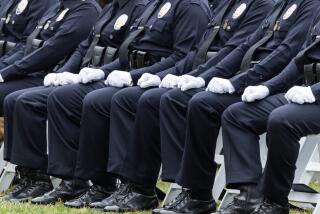Supreme Court takes up text privacy case
- Share via
Reporting from Washington — The Supreme Court said Monday it would rule for the first time on whether employees had a right to privacy when they sent text messages on electronic devices supplied by their employers.
The justices agreed to hear an appeal from the city of Ontario, which was successfully sued by police Sgt. Jeff Quon and three other officers after their text messages -- some of which were sexually explicit -- were read by the police chief.
At issue is whether the chief violated their rights under the 4th Amendment, which forbids “unreasonable searches” by the government. The Supreme Court’s ruling on the issue, due by June, could set new rules for the workplace in public agencies, and perhaps in private companies as well.
While the 4th Amendment applies only to the government, many judges rely on the high court’s privacy rulings in deciding disputes in the private sector, legal experts say.
Last year, the U.S. 9th Circuit Court of Appeals broke ground when it ruled the officers had a “reasonable expectation of privacy” in their text messages. The officers had been led to believe by a supervisor that they could use their pagers for personal use, the appeals court said.
However, the city had a policy that said employees had no guarantee of privacy when they used computers, phones and other devices that were owned by the city.
The 9th Circuit’s ruling has already had an impact.
“It was a healthy reminder to employers that they need to have clear policies in place. And they have to be consistent in following them,” said Mitch Danzig, a management lawyer in San Diego.
Workplace rights advocates hailed the 9th Circuit’s decision because it was the first to uphold the privacy rights of employees.
“Everyone has been watching the Quon case because it is the first involving the new generation of communications technology,” said Lewis Maltby, president of the National Workrights Institute in Princeton, N.J.
Even though computers, cellphones and e-mails have been in standard use for two decades, most judges still rely on legal precedents involving wiretaps on telephones when deciding privacy issues, Maltby said.
“There’s no question we need more guidance from the courts when it comes to communication in the Internet age,” said Robert Shwarts, an employment lawyer in San Francisco.
Nonetheless, he questioned the 9th Circuit’s view that Quon had a “reasonable expectation of privacy” when he sent text messages to his girlfriend with the pager supplied by the police department.
“You have an expectation of privacy when you put a letter in the mail. I don’t think you have the same expectation when you are sitting in the office using the company’s computer to send an e-mail,” Shwarts said.
The case began in 2002 shortly after officers were given pagers that could send text messages. Quon and his co-workers said they were told by a supervisor they could use their pagers as they saw fit, so long as they paid out of their pocket if they used more than 25,000 characters per month.
The city had contracted with Arch Wireless Operating Company Inc. to provide the texting service. Quon and three other officers sued after learning their messages had been read.
They were not disciplined, but they said the search violated their privacy under the Constitution.
The 9th Circuit agreed and also found that Arch Wireless violated the federal Electronic Communications Privacy Act when it revealed Quon’s text messages without his consent.
The justices let stand the ruling involving Arch Wireless but voted to hear the city’s challenge to the ruling involving the 4th Amendment and the right to privacy.
The court said it would hear arguments in the case, City of Ontario vs. Quon, in the spring.
More to Read
Inside the business of entertainment
The Wide Shot brings you news, analysis and insights on everything from streaming wars to production — and what it all means for the future.
You may occasionally receive promotional content from the Los Angeles Times.











